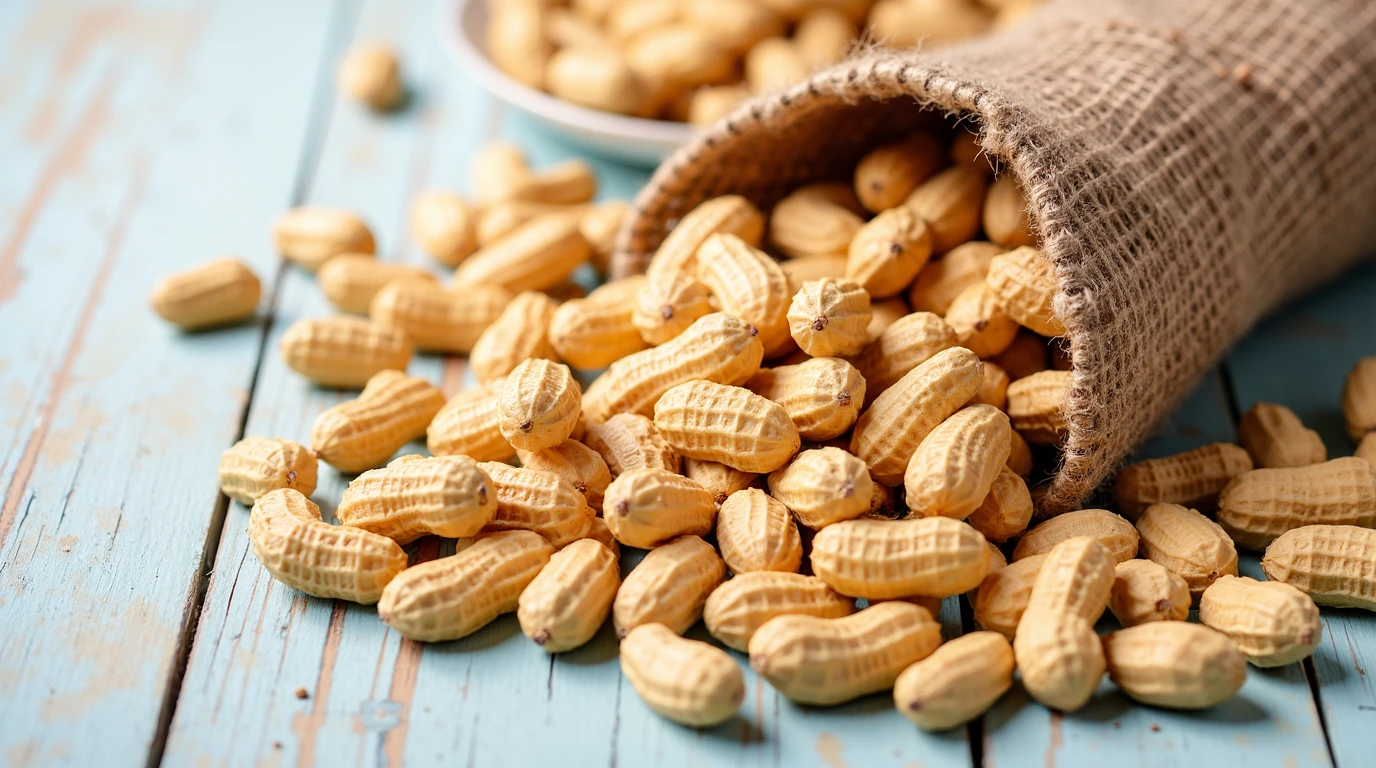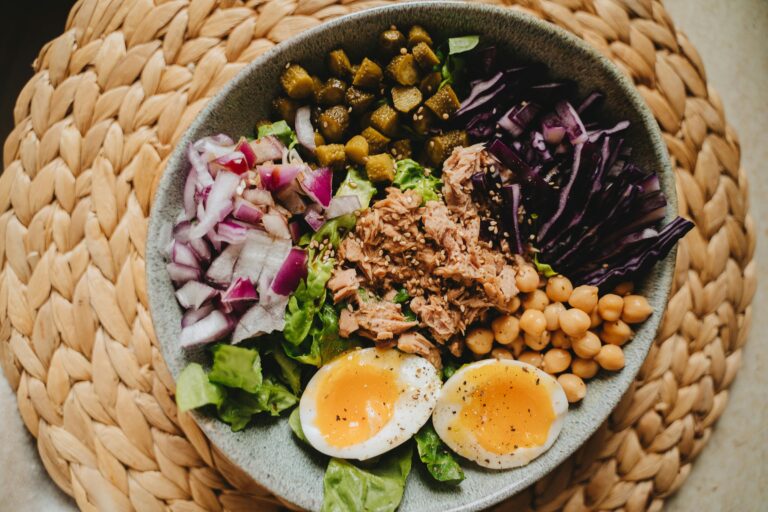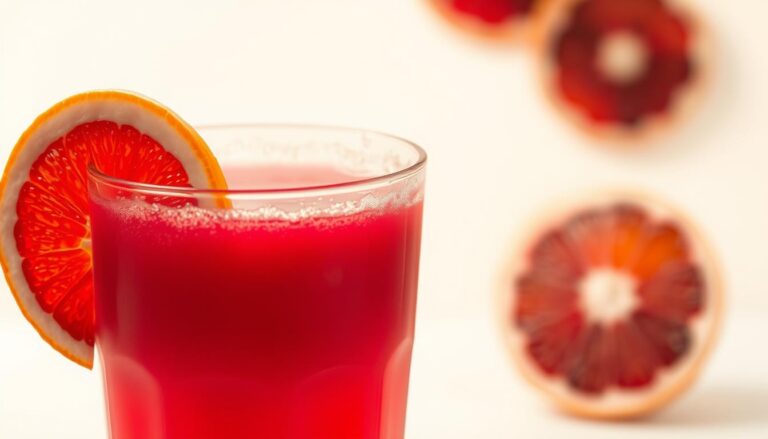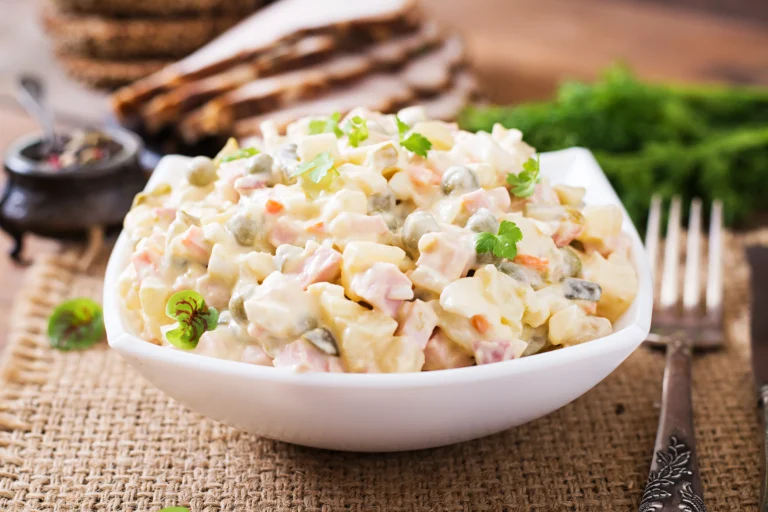Discover the Amazing Benefits of Peanuts for Athletes
As an athlete, I always look for the best nutrition to boost my performance and help me recover. Peanuts surprised me by becoming a key part of my sports diet. They offer more than just a quick snack.
Every nutrient matters when you’re pushing your body to its limits. Peanuts are packed with over 30 vitamins and minerals. They give you a big dose of what you need to perform at your best.
One ounce of peanuts has 7 grams of protein, more than any other nut. This helps your muscles grow and gives you the energy you need. Peanuts are more than food; they’re a secret weapon for athletes in every sport.
Table of Contents
Nutritional Profile of Peanuts for Athletic Performance
Peanuts are a nutritional powerhouse that can boost your athletic performance. They are packed with essential nutrients. These nutrients support muscle growth, energy production, and overall health.
Peanut nutrition is more than just counting calories. They offer a mix of protein, vitamins, and minerals. This makes them perfect for athletes looking to perform at their best.
Essential Vitamins and Minerals
Your body gets a lot of benefits from peanuts. Here are some key nutrients that help athletes perform better:
- Vitamin E: Powerful antioxidant protecting muscle cells
- Magnesium: Supports muscle function and energy production
- Niacin: Helps convert food into usable energy
- Potassium: Maintains fluid balance and supports nerve health
Protein Content and Amino Acids
Peanut protein is a standout among plant-based options. A single serving has about 7 grams of high-quality protein. This is key for muscle repair and growth.
| Nutrient | Amount per 1-oz Serving |
|---|---|
| Protein | 8 grams |
| Fat | 15 grams |
| Carbohydrates | 4 grams |
| Fiber | 2 grams |
Healthy Fats Distribution
Peanuts are full of heart-healthy monounsaturated fats. These fats give you sustained energy during workouts. They also reduce muscle inflammation and support heart health.
Adding peanuts to your diet unlocks a natural, nutrient-rich food. It supports your athletic goals and helps you stay at your best.
Benefits of Peanuts for Muscle Growth and Recovery
Athletes aiming to grow muscles and recover quickly can benefit from peanut protein. Peanuts have about 7 grams of protein per ounce. This makes them a strong nutritional choice for building muscle.
A study from Auburn University shows peanuts’ power in building muscles. It found that adding peanut powder to workouts boosts muscle strength and growth.
- Peanuts have essential amino acids for muscle building
- They have a lot of protein to help muscles repair after hard workouts
- Leucine in peanuts is important for making muscle protein
Peanuts offer more than just protein. They also have nutrients that help athletes perform better:
- They have 25% protein by weight
- They have healthy fats
- They have minerals like magnesium
“Peanuts are a natural, nutrient-dense food that can significantly contribute to muscle growth and recovery,” says nutrition experts.
To build muscles well, athletes should eat 2-4 tablespoons of peanut butter a day. Peanut butter is a natural protein source. It helps muscles recover, keeps energy up, and boosts athletic performance.
Pro tip: Choose natural, USDA-certified organic peanut butter to get the most nutritional benefits and avoid processed ingredients.
Pre and Post-Workout Peanut Consumption Guide
Athletes can boost their performance with peanuts. They are packed with nutrients that help during and after workouts. This makes them a great snack before and after exercise.
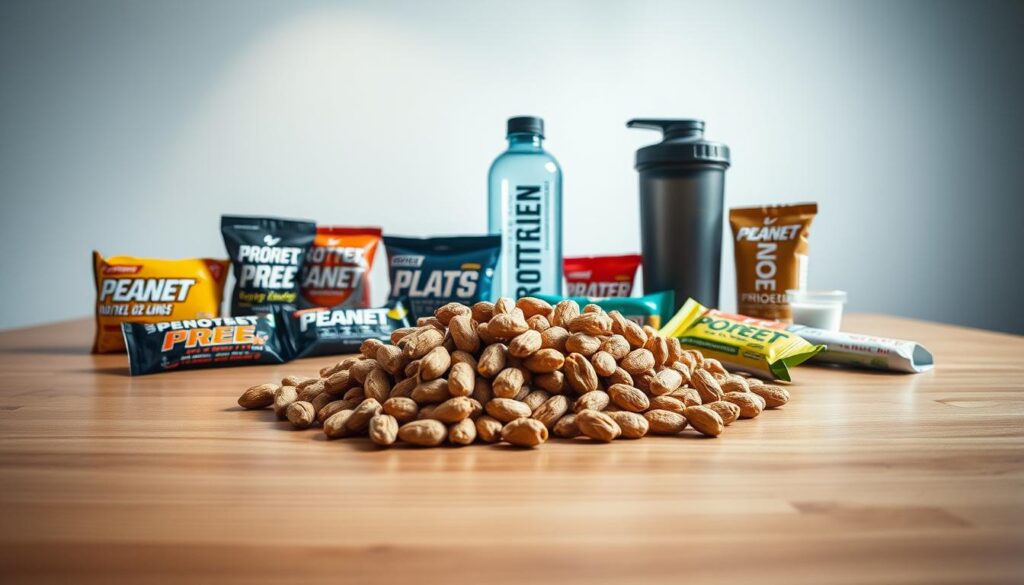
Adding peanuts to your diet can really improve your workouts. They do more than just fill you up. They help your muscles recover and keep your energy up.
Timing Your Peanut Intake
When you eat peanuts matters for your performance. Here’s when to eat them:
- Pre-workout: Have 1 ounce (about 35 peanuts) 30-60 minutes before you start.
- Post-workout: Eat 1 ounce within 30 minutes after to help your muscles.
- Eat peanuts throughout the day to keep your energy steady.
Portion Size Recommendations
The best amount of peanuts is 1 ounce. It gives you:
- 8 grams of protein
- 180 calories
- 15 grams of healthy fats
- 4 grams of carbs
Quick Peanut Snack Ideas
Make your diet better with these easy peanut snacks:
- Peanut butter on whole-grain toast
- Peanut butter smoothie with banana
- Handful of dry-roasted peanuts
- Rice cake with peanut butter and sliced fruit
By adding peanuts to your diet, you can get the most out of their nutrition. They support your performance and recovery.
Endurance Enhancement and Energy Sustainment
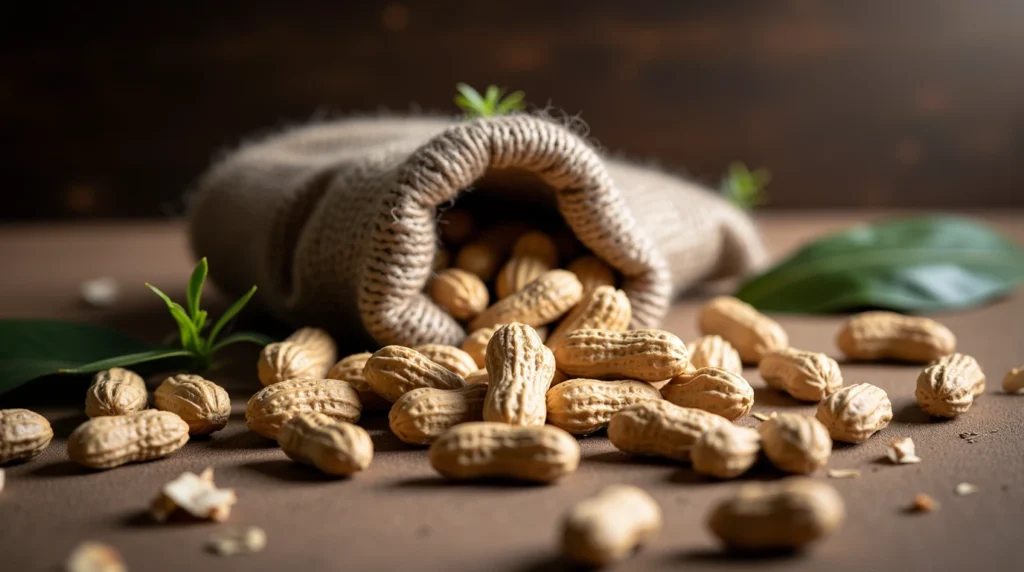
Peanuts are a powerhouse of nutrition for athletes. They help with sustained energy and improved endurance. A 2022 study found that eating 30 grams of peanuts before exercise boosts performance.
Peanuts are great for endurance athletes. They have complex carbs and healthy fats. These give slow-release energy during intense workouts. This energy helps you stay at your best when it counts.
Key Endurance-Boosting Components
- Complex carbohydrates for sustained energy release
- Healthy monounsaturated and polyunsaturated fats
- Antioxidants like resveratrol that combat exercise-induced stress
- Essential minerals supporting muscle function
Peanuts do more than just give you energy. They also have antioxidants that help reduce stress from exercise. This can improve recovery times and long-term performance.
“Peanuts provide a natural, nutrient-rich fuel source for athletes seeking sustained performance.” – Sports Nutrition Research Team
Adding peanuts to your diet can help you keep energy up during long activities. They’re good for marathon runners, cyclists, and all endurance athletes. Peanuts are a smart choice for better performance.
Weight Management and Lean Body Mass Benefits
Peanuts are a great help for athletes looking to manage their weight and improve body composition. They have a special mix of nutrients that helps keep muscle mass while boosting athletic performance.
Strategic Body Composition Support
Eating peanuts can really help your body’s composition. A 2024 study found that adding peanuts and peanut butter to workouts led to better muscle growth.
- Provides 8 grams of protein per two-tablespoon serving
- Contains healthy unsaturated fats supporting metabolism
- Offers essential nutrients for muscle maintenance
Appetite Control and Satiety
Peanuts also help control hunger. They have protein, fiber, and healthy fats that keep you full. Studies show eating a small amount of peanut butter can stop you from eating too much later.
Caloric Efficiency for Athletes
Peanuts are a smart choice for athletes trying to manage their weight. One ounce has 161 calories and gives lasting energy. Eating a handful a day helps keep your weight in check without losing out on nutrients.
Eating about one ounce of nuts several days per week supports effective weight management strategies.
Adding peanuts to your diet can help grow muscle, control hunger, and keep your body in shape. They’re a tasty and healthy choice.
Potential Considerations and Side Effects
Peanuts are great for health, but athletes need to know the risks. Peanut allergy is a big worry, with more kids getting it since 2010. About 25% of US kids might be allergic to peanuts, so it’s important to be careful with food.
Things athletes should think about include:
- Peanut proteins can cause allergic reactions
- Peanuts are high in calories, so eat them in small amounts
- There’s a chance of aflatoxin contamination
- Peanuts might not mix well with some medicines
To get the most health benefits from peanuts, know how much you can handle. The daily limit is 42 grams, but watch your intake. If you have health issues or allergies, talk to a doctor before eating peanuts.
Possible side effects are:
- Allergic reactions that can be mild or severe
- Stomach problems
- Medicine interactions
- Weight gain if you eat too many
There’s a risk of getting other foods contaminated with peanuts. Athletes should choose high-quality peanuts from trusted places to avoid health problems.
Always put your health first when thinking about changing your diet.
Conclusion
Exploring peanut nutrition shows us a food that boosts athletic performance. Peanuts are more than just a snack. They are a nutritional powerhouse with 25.8 grams of protein per 100 grams. They also have essential nutrients for muscle growth, endurance, and health.
Adding peanuts to your diet can greatly improve your athletic abilities. They have a low glycemic index of 13 and a rich nutrient profile. This means they give you sustained energy, help with weight management, and provide minerals like magnesium and phosphorus. These minerals fuel your training goals.
While peanuts are very beneficial, everyone’s nutritional needs are different. Talking to a sports nutritionist can help you tailor your diet. They can ensure you get the most out of peanuts without upsetting your diet balance. Eating about 16 peanuts a day can give you big health benefits.
Your athletic performance depends on many factors, including nutrition, training, and recovery. Peanuts are a natural ally in this journey. They offer protein, healthy fats, and micronutrients that can boost your physical abilities. Make peanuts a key part of your nutrition plan.

